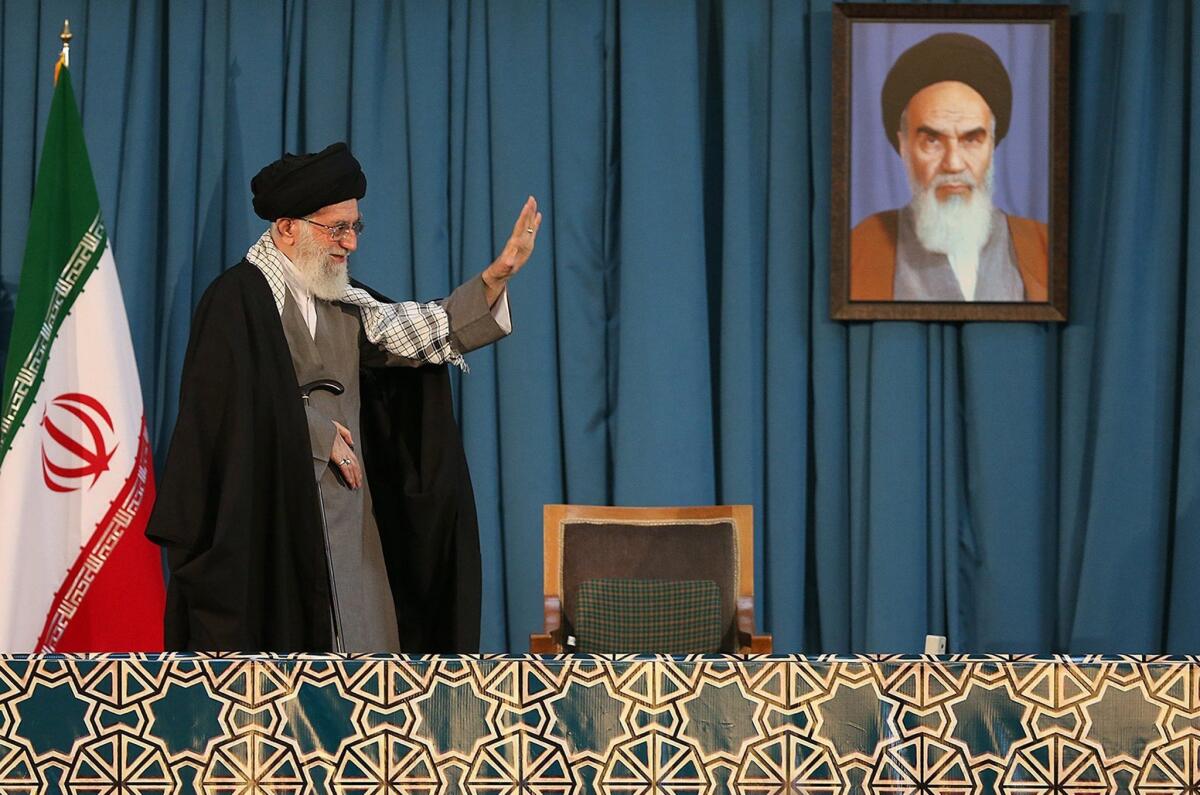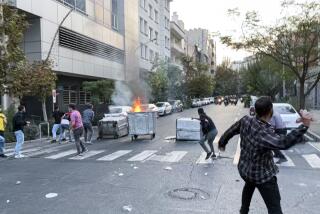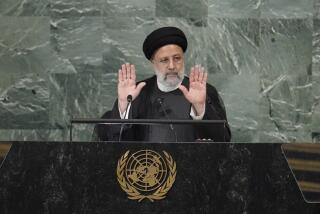As crowd chants ‘Death to America,’ Khamenei backs nuclear talks

- Share via
Reporting from Tehran — Iran’s supreme leader on Saturday urged Iranians to support their government’s efforts to negotiate a nuclear deal, even while denouncing the United States and other Western governments involved in the talks.
In a much-anticipated speech on the first day of Nowruz, the Iranian New Year, Ayatollah Ali Khamenei said all Iranians should support the government of President Hassan Rouhani, even if they didn’t vote for him in the presidential election. Rouhani has made negotiation of a nuclear deal with world powers a centerpiece of his administration.
Khamenei, speaking before a boisterous crowd in the northern holy city of Mashhad, also demanded that a nuclear deal end economic sanctions on Iran at its outset, rather than gradually, as the United States and five other world powers have said during negotiations.
“Sanctions must be lifted immediately,” Khamenei said.
The comments came as the United States and five other world powers have been racing to complete the outline of a nuclear pact with Iran by month’s end. The world powers would lift sanctions that have been hobbling Iran’s economy if Tehran agreed to restrictions aimed at keeping it from obtaining nuclear weapons capability.
U.S. Secretary of State John Kerry on Saturday urged a quick resolution, amid French warnings that too much haste could yield a bad deal.
In a rare hint of division between Western governments on the issue, Kerry said the nations bargaining with Iran — the U.S., France, Britain, Germany, Russia and China — should try to complete the outline of a deal by March 31.
The decisions “don’t get any easier as time goes by,” he said before leaving Lausanne, Switzerland, where the negotiations were being held, and heading to London for a late afternoon meeting with French, German and British foreign ministers.
Gerard Araud, France’s ambassador to the United States, said Friday on Twitter that the U.S. target deadline was a “bad tactic” that would put the six powers at a disadvantage in the bargaining. President Obama telephoned French President Francois Hollande on Friday to discuss the negotiations, among other issues.
Obama, in an interview with the Huffington Post published Saturday, cautioned that it was too soon to say that a draft agreement was being sent around but reiterated that the U.S. would like a deal done soon.
“There is no deal until everything is worked out, and I think that it’s premature to suggest that there is a draft out there,” Obama said. “What is true is that there has been movement from the Iranian side.”
In Tehran, Khamenei on Saturday attacked Obama’s recorded Nowruz message to Iranians, which was released Thursday. In the video, Obama appealed to younger Iranians to press their government to agree to a deal, saying it would restore Iran’s ties to the world and improve their lives.
The Americans “want to turn the people against the government,” Khamenei said, calling Obama’s message “dishonest.”
As the supreme leader spoke, a crowd chanted, “Death to America.” Khamenei said the rhetoric was justified because America is behind all threats to Iran.
Despite such criticism and the terms he is seeking, Khamenei’s speech represented a qualified support for continued negotiations, analysts said.
Ali Khorram, a former top Iranian diplomat, said the supreme leader was signaling that Iran was ready to negotiate and that “if the deal doesn’t happen, it is the fault of the USA.”
In this way, Khamenei was seeking to balance the demands of Iran’s political reformers, who are eager for a deal, and conservatives who are deeply wary, Khorram said.
In comments to Iranian reporters Saturday, Rouhani said a deal would face “pressures” as it moved toward conclusion.
The United States and the other world powers have made the gradual lifting of sanctions a central demand. They want to be able to reinstate tough restrictions if Iran stops complying with the terms of the deal.
Iran is wary of leaving leverage in the West’s hands and has been pushing especially hard for a quick lifting of United Nations’ sanctions.
The Western governments publicly insist that there are no important differences among themselves. But French diplomats have been staking out tougher positions on some issues, diplomats said.
France has said it wants the deal to last 15 years; U.S. officials have sometimes said 10 to 15 years, though they have also said that the duration remains to be negotiated. U.S. officials want sanctions to be gradually removed as Iran takes steps to comply with the deal. France contends they should remain in force until later in the process.
Iranian officials, though generally optimistic in public remarks that a deal can be reached, have privately pointed to the French concern as a possible obstacle to completion of the deal in the next 10 days.
Any deal that would immediately remove sanctions probably would face fierce opposition in the West, Israel and much of the Arab world.
If the outline of a deal can be completed, negotiators would aim to iron out the remaining details of a comprehensive agreement by June 30.
Differences between the Western governments could prove awkward, because they have more leverage if they bargain as a unified group.
U.S. officials have sometimes said French statements were designed for domestic consumption. Some analysts say France’s demands reflect its desire to show key allies and business partners in the Arab world and Israel that it has done all it could to defend mutual interests.
Many diplomats consider it unlikely, however, that France would stand in the way if the United States and other countries at the table were ready to accept a deal.
Kerry said the meeting Saturday in London was an effort to reach agreement among the four Western governments on the final issues.
World powers suspended their talks Friday, with plans to resume in Lausanne on Wednesday.
Special correspondent Mostaghim reported from Tehran and Times staff writer Richter from Lausanne.
ALSO:
Column: The inconvenient truths in Tom Cotton’s letter to Iran
Top-secret U.S. replica of Iran nuclear sites key to weapons deal
Column: That GOP letter to Iran? Not illegal, but not smart either.
More to Read
Sign up for Essential California
The most important California stories and recommendations in your inbox every morning.
You may occasionally receive promotional content from the Los Angeles Times.







